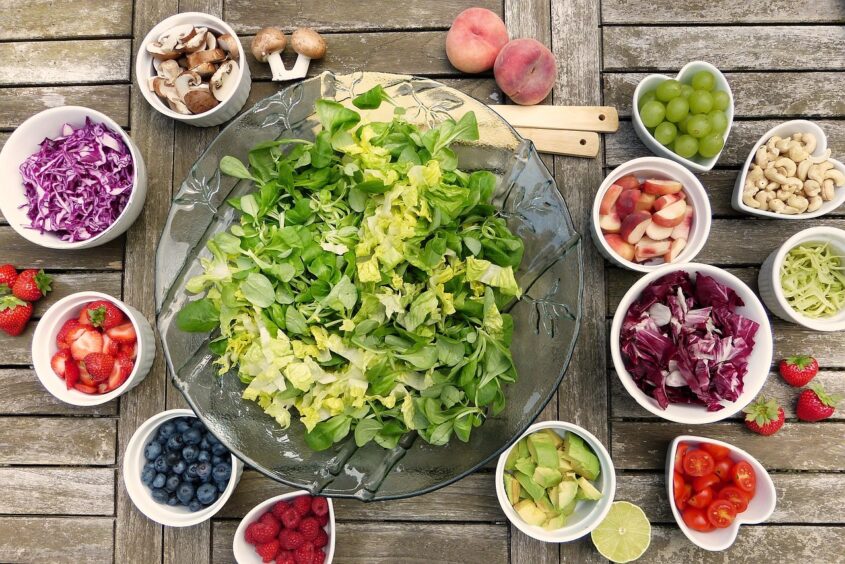Vegetarian Lifestyle: all the benefits

In recent years, there has been a remarkable surge in individuals adopting a vegetarian lifestyle; beyond being a dietary choice, vegetarianism is now recognized as a conscious decision with profound implications for personal health and the environment.
By eschewing meat and embracing plant-based alternatives, vegetarians unlock a multitude of benefits that extend far beyond their plates.
This article delves into the advantages of a vegetarian lifestyle, exploring how it promotes well-being, mitigates environmental impact, and fosters a more compassionate world.
Vegetarian Lifestyle: Improved Health and Well-being
Reduced risk of chronic diseases
Vegetarianism is associated with a reduced risk of various chronic diseases, including heart disease, obesity, type 2 diabetes, and certain types of cancer.
Plant-based diets are typically low in saturated fat and cholesterol, while rich in fiber, antioxidants, and essential nutrients. Such dietary patterns have been linked to lower blood pressure, improved blood sugar control, and enhanced overall health.
Weight management
A vegetarian lifestyle often facilitates weight management, as plant-based diets tend to be lower in calorie density.
A higher intake of whole grains, fruits, vegetables, legumes, and nuts promotes satiety while providing essential nutrients.
Studies have shown that vegetarians tend to have lower body mass indexes (BMIs) and reduced rates of obesity compared to their non-vegetarian counterparts.
Vital nutrients from plant-based sources
Contrary to popular belief, a well-planned vegetarian diet can provide all the necessary nutrients for optimal health.
By incorporating a diverse range of plant-based foods, vegetarians can obtain protein, iron, calcium, omega-3 fatty acids, and vitamins like B12 and D. Fortified foods and supplements can also be utilized to meet specific nutritional needs.

Vegetarian Lifestyle: Environmental Impact and Sustainability
Reduced greenhouse gas emissions
Animal agriculture is a major contributor to greenhouse gas emissions, deforestation and water pollution. Adopting a vegetarian lifestyle helps mitigate these environmental impacts; the production of plant-based foods requires fewer resources, such as land, water, and fossil fuels.
Choosing a vegetarian diet can significantly reduce an individual’s carbon footprint and contribute to combating climate change.
Conservation of natural resources
Animal agriculture necessitates vast amounts of water, grain, and land to sustain livestock production. By eliminating or reducing meat consumption, vegetarians contribute to the conservation of these valuable resources; a shift towards plant-based diets would alleviate the strain on freshwater reserves, reduce deforestation, and promote a more sustainable use of land.
Preservation of biodiversity
The expansion of animal agriculture often leads to the destruction of natural habitats and the loss of biodiversity.
Adopting a vegetarian lifestyle helps protect ecosystems by reducing the demand for land used for livestock feed and grazing; preserving biodiversity is essential for the long-term health of our planet and the survival of countless species.
Vegetarian Lifestyle: Ethical Considerations
Compassion for animals
One of the primary motivations for embracing a vegetarian lifestyle is the ethical treatment of animals. The intensive practices of factory farming and animal cruelty associated with the meat industry are increasingly concerning to many individuals.
By choosing plant-based alternatives, vegetarians actively demonstrate compassion towards animals, advocating for their well-being and reducing their suffering.
Promotion of sustainable food systems
Vegetarianism supports the development of sustainable and ethical food systems. It encourages a shift towards organic farming practices, humane animal husbandry, and the cultivation of plant-based foods.
By supporting local and organic produce, vegetarians contribute to the growth of environmentally conscious agriculture and foster more sustainable food production models.
What do vegetarian eat?
Vegetarians follow a diet that excludes meat, including poultry, red meat, seafood, and other animal-derived products.
However, there are different types of vegetarians, each with varying dietary preferences. Here are the main categories of vegetarian diets and the foods typically consumed by individuals following each:
Lacto-ovo vegetarians
Lacto-ovo vegetarians avoid meat but include dairy products (milk, cheese, yogurt) and eggs in their diet. Their food choices may include:
- Fruits and vegetables: a wide variety of fresh fruits and vegetables, both raw and cooked.
- Whole grains: foods like rice, quinoa, oats, wheat, barley, and whole-grain bread and pasta.
- Legumes: beans, lentils, chickpeas, and other legumes are excellent sources of protein.
- Dairy products: milk, cheese, yogurt, and other dairy-based products.
- Eggs: used in various preparations, such as omelets, scrambled eggs, or baked goods.
- Nuts and seeds: almonds, walnuts, flaxseeds, chia seeds, and more, providing healthy fats and protein.
- Plant-based oils: olive oil, coconut oil, avocado oil, and others for cooking and dressings.
Lacto vegetarians
Lacto vegetarians consume dairy products, but avoid eggs. Their diet includes all the foods mentioned above, excluding eggs.
Ovo vegetarians
Ovo vegetarians consume eggs but avoid dairy products. Their diet includes all the foods mentioned above, excluding dairy products.
Vegans
Vegans follow the strictest form of vegetarianism, excluding all animal-derived products. In addition to avoiding meat, dairy, and eggs, they also refrain from consuming honey, gelatin, and other animal-based additives.
Their diet typically includes:
- Fruits and vegetables
- Whole grains
- Legumes
- Soy products: tofu, tempeh, soy milk, and other soy-based products serve as protein sources.
- Plant-based milk: almond milk, coconut milk, soy milk, and other non-dairy milk alternatives.
- Nuts and seeds
- Plant-based oils
- Plant-based protein sources: seitan, textured vegetable protein, and plant-based protein powders.
- Grains and legume combinations: such as rice and beans, to provide complementary proteins.
It’s important for vegetarians to ensure they have a balanced diet and obtain essential nutrients like protein, iron, calcium, vitamin B12, and omega-3 fatty acids.
They can achieve this by incorporating a variety of plant-based foods and, if necessary, consulting with a healthcare professional or registered dietitian to ensure their nutritional needs are met.

Vegetarian meal plan for weight loss
Here’s a sample vegetarian meal plan for weight loss:
Day 1
- Breakfast: veggie scramble: sauté a mix of vegetables like bell peppers, onions, spinach, and mushrooms in olive oil, beat together tofu, nutritional yeast, turmeric, and salt, and add it to the pan. Cook until heated through and serve with a side of whole-grain toast.
- Lunch: chickpea salad: combine cooked chickpeas, diced cucumber, cherry tomatoes, red onion, and chopped fresh herbs. Dress with a mixture of lemon juice, olive oil, garlic, salt, and pepper. Serve on a bed of mixed greens.
- Afternoon snack: greek yogurt with berries: enjoy a serving of plain greek yogurt topped with a handful of mixed berries and a sprinkle of granola or nuts for added crunch.
- Dinner: lentil and vegetable stir-fry: sauté a mix of colorful vegetables like broccoli, bell peppers, carrots, and snow peas in sesame oil. Add cooked lentils and a sauce made from soy sauce, ginger, garlic, and a touch of honey or maple syrup. Serve over brown rice or quinoa.
Day 2
- Breakfast: overnight chia pudding: mix together chia seeds, almond milk, and a touch of vanilla extract. Let it sit in the refrigerator overnight. In the morning, top it with sliced banana, chopped nuts, and a drizzle of honey or agave syrup.
- Lunch: spinach and quinoa salad: combine cooked quinoa, fresh spinach, cherry tomatoes, avocado slices, and crumbled feta cheese. Dress with a lemon-tahini dressing made from lemon juice, tahini, water, garlic, salt, and pepper.
- Afternoon snack: veggie sticks with hummus: enjoy a variety of raw vegetables such as carrots, celery, bell peppers, and cucumber, with a side of homemade hummus for dipping.
- Dinner: black bean and sweet potato enchiladas: fill whole-wheat tortillas with a mixture of mashed sweet potatoes, black beans, diced onions, and spices. Top with enchilada sauce and a sprinkle of cheese (optional). Bake until heated through and serve with a side of mixed greens.
We have tried these menus, and I can only tell you that besides being healthy and nutritious, they are delicious!
Remember to adjust portion sizes and the number of snacks according to your individual calorie needs and dietary preferences.
It’s also essential to drink plenty of water throughout the day and listen to your body’s hunger and fullness cues. Consulting a registered dietitian can provide personalized guidance and support for your weight loss journey.
Is being vegetarian a healhty lifestyle choice?
Yes, being vegetarian can be a healthy lifestyle choice; vegetarian diets, when properly planned and balanced, can provide all the necessary nutrients for good health.
Plant-based diets are typically rich in fruits, vegetables, whole grains, legumes, nuts, and seeds, which offer an abundance of vitamins, minerals, fiber, and antioxidants.
By focusing on these nutrient-dense foods, vegetarians often consume less saturated fat and cholesterol compared to non-vegetarians.
This can lead to a reduced risk of chronic diseases such as heart disease, obesity, type 2 diabetes, and certain types of cancer. Additionally, vegetarian diets are typically higher in fiber, which promotes digestive health and helps maintain a healthy weight.
However, it’s important for vegetarians to pay attention to certain nutrients that may be more challenging to obtain from a plant-based diet, such as protein, iron, calcium, vitamin B12, and omega-3 fatty acids.
Proper meal planning and incorporating a variety of plant-based protein sources, such as legumes, tofu, tempeh, and whole grains, can help meet these nutritional needs.
Ultimately, a well-planned vegetarian lifestyle can contribute to overall health and well-being, but it’s important to consult with a healthcare professional or registered dietitian to ensure nutritional adequacy and to address any specific dietary concerns.
In conclusion…
Embracing a vegetarian lifestyle encompasses a range of benefits, spanning personal health, environmental sustainability, and ethical considerations.
By opting for plant-based diets, individuals can reduce their risk of chronic diseases, maintain a healthy weight, and access vital nutrients from diverse sources.
Moreover, the environmental impact of animal agriculture can be significantly curbed by adopting vegetarianism, helping mitigate climate change and conserve natural resources.
Additionally, vegetarianism promotes compassion for animals and supports the growth of sustainable food systems.
With these compelling reasons in mind, choosing a vegetarian lifestyle emerges as a powerful choice for personal well-being and a more sustainable planet.



